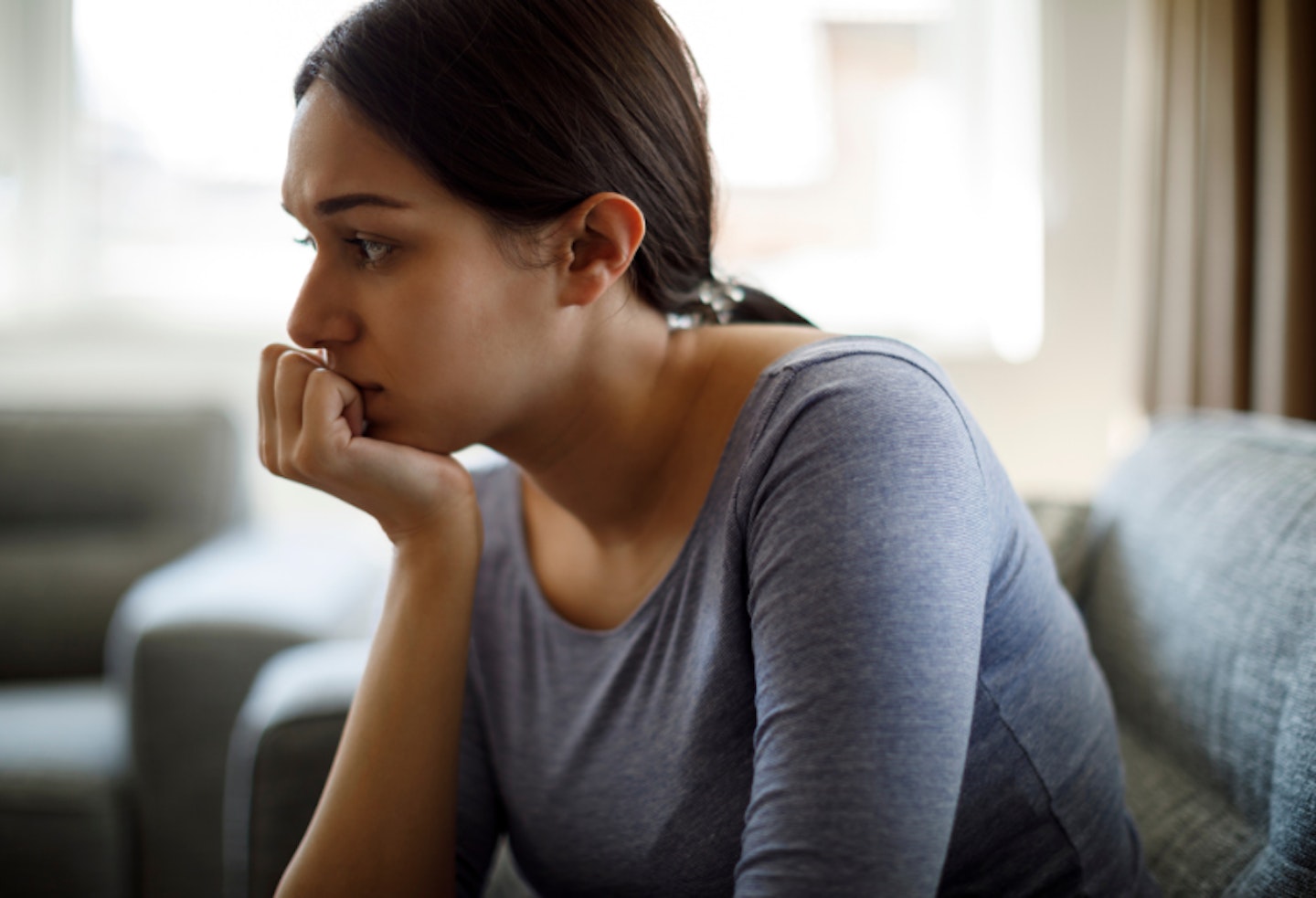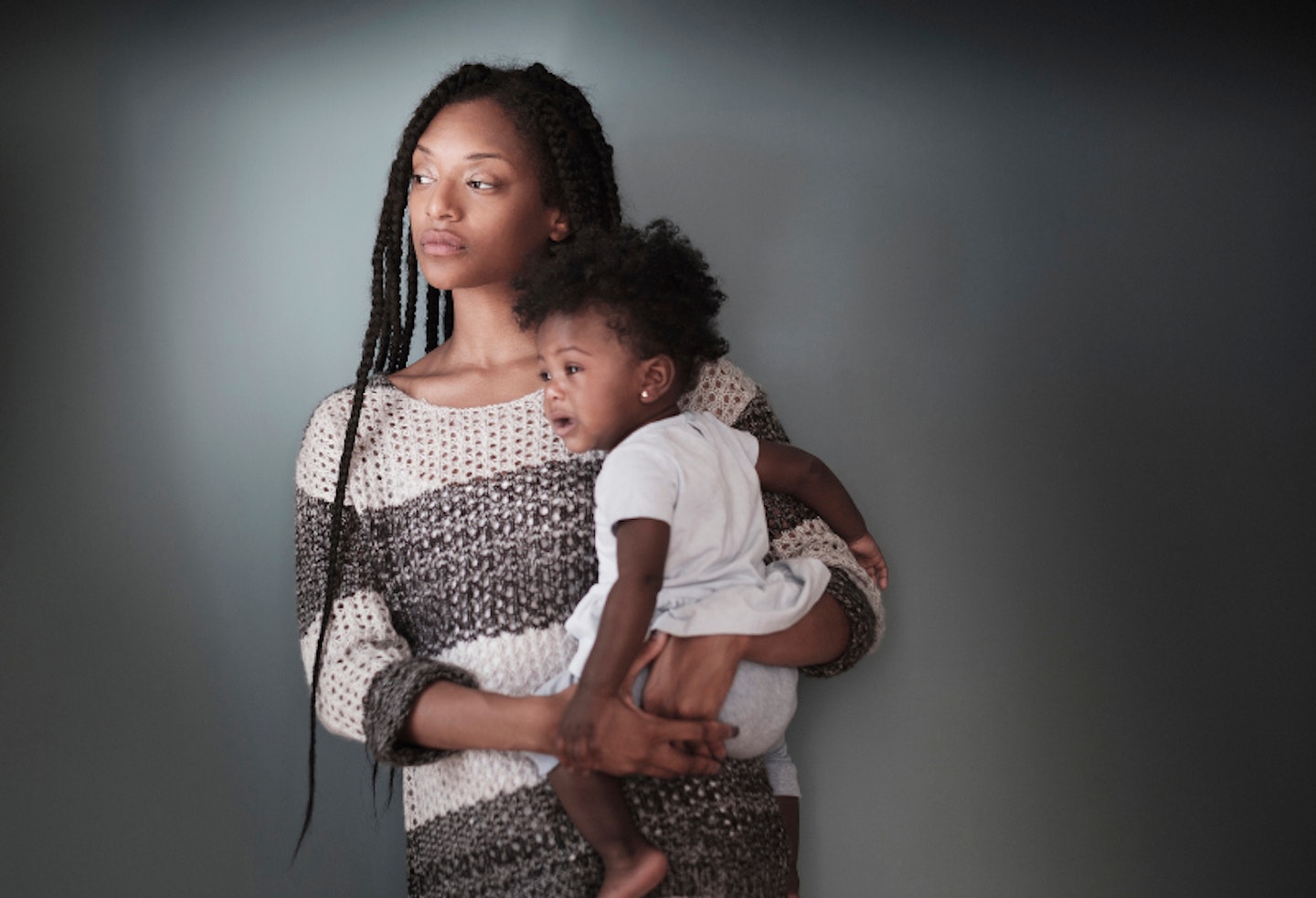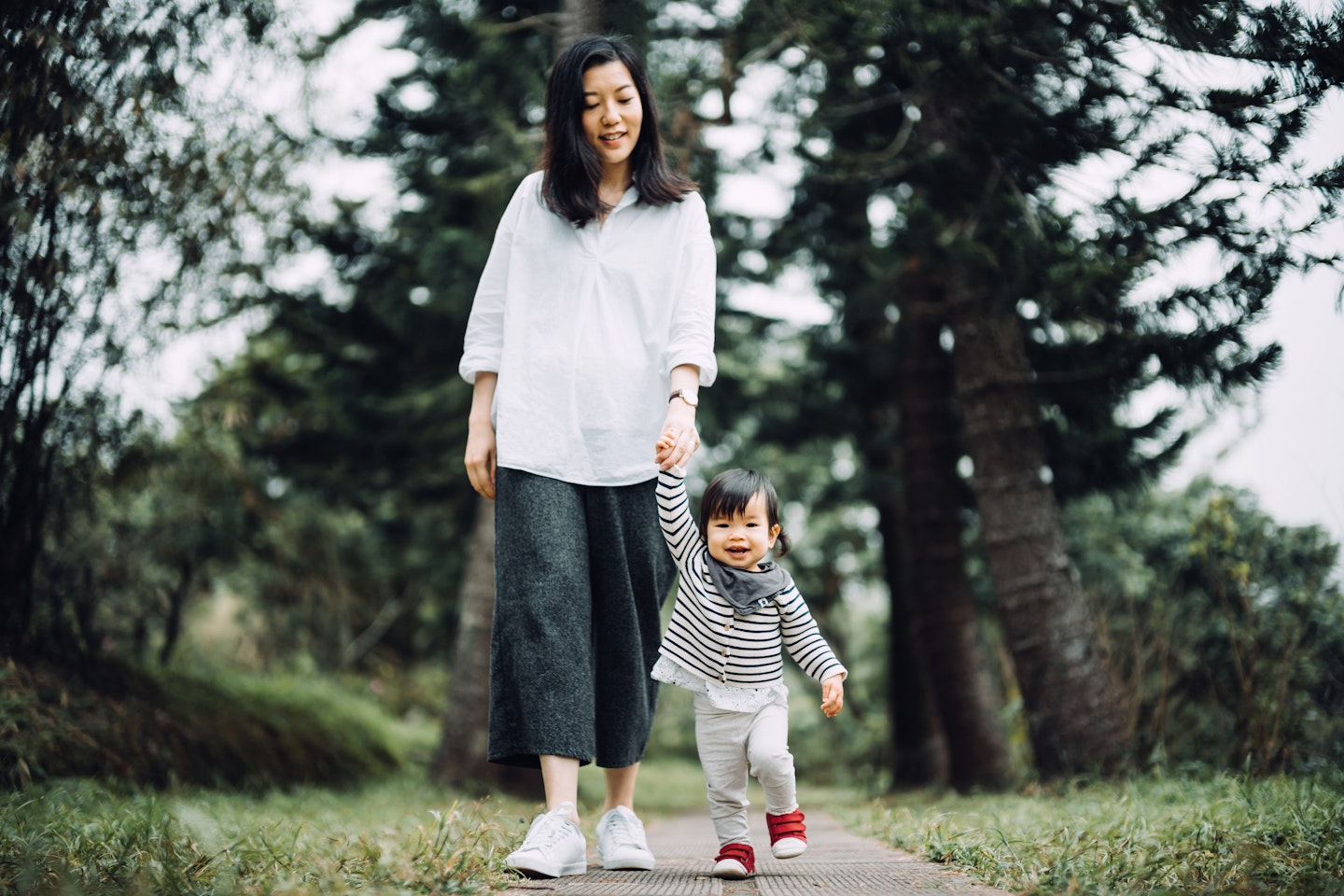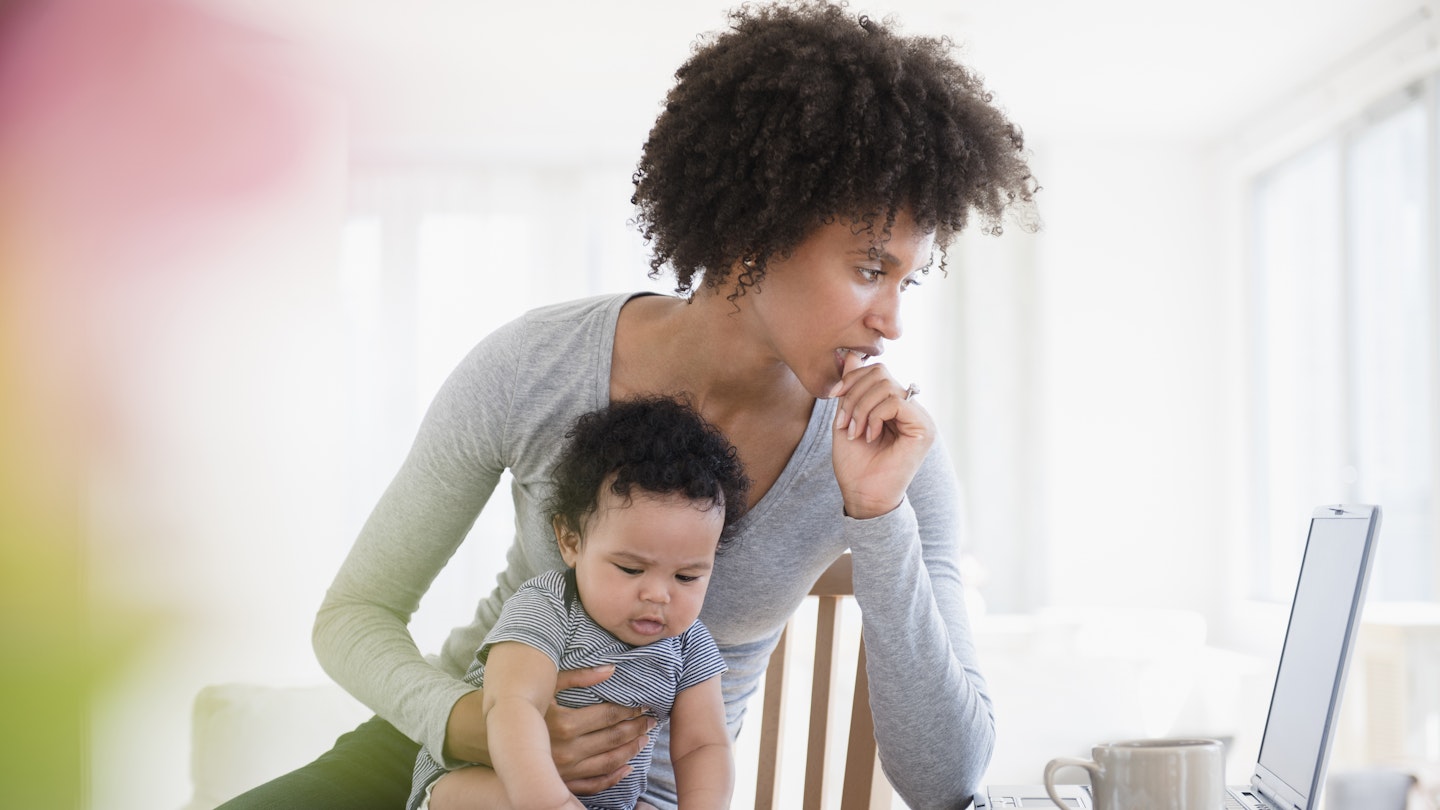Becoming a mum is an emotional rollercoaster. There’s joy, fear, frustration, not to mention take-your-breath-away love. And, for some of us, there can also be anxiety. ‘Mentally, anxiety can feel like your head is very full,’ explains psychotherapist Anna Mathur. ‘The feelings that come with anxiety are often quite negative and fear-based: sad, scared… it’s that sense of being out of control.’
Physically what happens when we’re anxious is that your nervous system kicks off what’s called a fight or flight response. ‘Back in the day of cavemen, a lot of what was feared was very tangible, such as a bear threatening the family’s food resources. So the caveman had a very physical response because he had to move fast – he had to fight or to gather and run,’ says Anna. ‘Now, we still have that innate physical response, but it’s often to things in our mind that we don’t need to fight or flight from. Your heart may start racing, your breath shallowing, and you might feel sick or shaky.’ This is your nervous system’s way of getting your body ready to run, because it thinks you’re at risk.
If you’re wondering whether anxiety is something you’ve experienced yourself, keep in mind there’s a difference between worry and anxiety. Worry tends to be more proactive. For example, say you’ve got an appointment with your midwife and you’re worried you’re going to be really late. ‘That worry will probably make you move a bit faster that morning and get out the door with an extra few minutes to spare. And then the event happens, and the feeling subsides. It tends to be quite circumstance focused,’ says Anna.
On the flip side, anxiety is more of a feeling that is usually attached to something that you can’t be proactive about. ‘We tend to be anxious about things that are completely out of our control,’ she explains. ‘Anxiety feels all-consuming and stifling, whereas worry tends to pass. I think everyone has anxiety to a degree, it just depends on how much it is impacting your experience of motherhood. That’s what differs from person to person - we all have fears and anxieties; it just costs us more when we become a mum.’

And, when you think about it, it’s no surprise that a lot of parents experience anxiety. After all, you’ve entered this brand-new world, which is completely overwhelming in more ways than one. ‘When we go about our day to day lives pre-baby, we can respond to our emotions, our needs and our wants pretty quickly. But all of that changes when we have a baby,’ says Anna. ‘There are now so many more opinions, so many more emotions and the tiredness stops us processing things as easily as we might have normally done. That sense of lack of control is far more polarised and brought into sharp focus when we have this baby that we feel such love for. We can do our very best, but we can’t control how or when she will sleep, what makes her cry or how strong her immune system is. Suddenly, the stakes are so much higher.’
Unfortunately, anxiety is much more common in the 21st Century than it once was, for numerous reasons beyond our control. ‘There’s a lot more pressure now, and we’re exposed to so many people’s filtered experience of motherhood, which we compare ourselves to. And we’re so much more prone to comparison when we’re navigating a massive life shift, which is exactly what motherhood is, and far more likely to use other people’s experiences as a ruler to measure how well we’re doing,’ says Anna.
While the numerous resources we have available at our fingertips can be hugely beneficial, they can also be overwhelming when you’ve already got so much going on in your life. ‘We’re constantly switched on; we’re always watching, listening and reading. This means we rarely ever have space in our brains. This calm and quiet space is how we’ve historically processed feelings and emotions, so when those are going unprocessed, this means we’re not really listening or validating our needs and our emotions in the way we used to when we had more headspace,’ explains Anna.

If you’ve felt at times that your anxiety has impacted your experience of motherhood, you’re not alone. ‘When we’re anxious, we’re feeling emotions that we don’t necessarily need to feel until those situations have come to pass,’ says Anna. ‘For example, your baby could have a rash and you might be feeling anxious that it’s something really bad, and you’re imagining the worst scenarios that are most likely completely unnecessary. As a result, you have less space to enjoy the good things in your life, like the relationship with your child.’
Understandably, you’re probably keen to do what you can to stop feeling anxious. But sometimes the things you do to try to feel better can actually make you feel worse. This includes comparing your circumstances with those of other people in an effort to justify or shut down your feelings. Comparison may give you a sense of control, but it’s actually really counterproductive. ‘Comparison only makes us feel better and validated superficially. Like a drug, we seek another fix when we look at external things to tell us whether we’re OK or not. We end up on a bit of a rollercoaster of emotions, dependent on what we conclude,’ says Anna.
It’s easy to compare yourself to another mum when you don’t know the whole picture, too. That flawless Insta-mum you follow may like she has the perfect life with her glossy photos but, in reality, her baby just won’t sleep and she’s going through a rough patch with her husband. It’s normal to want to pretend that everything is OK when it’s not, and we’re all guilty of doing so from time to time. ‘Many of us are trying to endear to this Supermum ideal, when we’re actually really finding life challenging. We think: “If I let on that I’m coping, then people won’t worry about me”’, says Anna. ‘But what happens when we do that is that we’re ignoring so many valuable feelings that are completely valid, and this just puts pressure on ourselves to appear fine when we could really do with some help.’ Often, you may not want to burden your family and friends, instead pulling back when you should be letting people know how you’re feeling and leaning into them for support. Remember, asking for help doesn’t make you a bad mum. In fact, we reckon it makes you pretty amazing.
And it’s worth remembering there’s actually a very good reason that anxiety exists. ‘Anxiety in itself is a mechanism that is there to keep us safe; it’s there to cause us to react quickly,’ reassures Anna. ‘Say you were holding your baby and he suddenly slipped, you’d get this sudden rush of adrenaline that would enable you to act really quickly and catch the baby. Our brain recognises a threat and our body kicks in.’ But it’s when anxiety is used when it doesn’t need to be, and we trigger that fight or flight response, that things can get complicated. ‘We’re living in these very heightened states and our body isn’t created to be in that state consistently. It’s there for short, sharp bursts, like with the caveman protecting his family,’ says Anna. ‘However, we seem to be living in these chronic states of fear because we are overthinking habitually and overstimulating ourselves, so that our body thinks we’re constantly being threatened. Which is why there’s that heightened feeling all the time, and why we can struggle to sleep as we’ve got all this adrenaline and cortisol running around our body.’
But if you are suffering from anxiety, where do you even begin to ease these thoughts? ‘Often when we feel anxious, our internal self-critical dialogue is a bit louder. We’re often feeling quite alone with our feelings, so we need to look after ourselves, we need energy to be able to address our thoughts and to enjoy our children,’ says Anna. ‘It’s so important to engage in little acts of self-care. I’m talking simple things like drinking enough water or going for a wee when you need to.’
It’s easy to forget to think about your own needs and feelings when suddenly all of your love and attention is on your baby. But loving and tending to your baby doesn’t mean that you should stop loving and tending to yourself. ‘My husband and my children get to enjoy me a lot more when I’m looking after myself, because I’m far less likely to feel resentful, frustrated and burnt out. When you’re feeling that way, you have less resilience against those anxious thoughts. It all feeds back into each other,’ says Anna.
And just because anxiety is common, it doesn’t have to be your normal. ‘There is so much more than a motherhood that is tainted and impacted by anxiety,’ reassures Anna. ‘But there is so much hope that you can find mechanisms to experience more joy, and less anxiety, so you can get your headspace back.’
Six ways to ease anxiety
Ditch Dr Google
‘Be careful of where it is that you are searching for your answers. Dr Google is not your friend, and forums for symptom checking are not helpful because there are so many different responses. Instead, speak to an experienced trusted friend or family member, or use valid resources such the NHS to ensure you’re going to the right places.’
Head outside
‘There is more and more research being published that suggests that spending time in nature reduces feelings of anxiety, stress and depression. The other day, after being indoors writing and juggling kids, as soon as my husband came home, I dashed out for a quick ten-minute stride around the block. My mind went from fuzzy to refreshed. So, get your trainers on, stick on some uplifting music or a podcast, and get out there.’

Just breathe
‘I think breathing techniques are brilliant to address the symptoms of anxiety. This helps calm down your nervous system when you’re feeling anxious. It says to your body, “Everything is OK. You aren’t at threat.” Use this whenever you’re stressed or frustrated. Breath steadily, in for four through your nose, right down into your tummy. Then breath out through your mouth to the count of eight. Start with four repetitions and increase as you feel more confident.’
Count
‘Something such as counting back from 100 in threes is a great way to stop yourself from overthinking and to shut the door on that cycle of thoughts. Nobody can count back from 100s in threes and be imagining all kinds of catastrophic scenarios!’
Consider your internal dialogue
You drop your baby’s dinner that you’ve spent all day making. What’s the first thing you say? Do you ridicule yourself in frustration? Call yourself stupid? ‘If you wouldn’t speak to your child the way you’re speaking to yourself, it’s not good enough for you either. Start trying to introduce a softer, more compassionate voice,’ says Anna. You can then use this voice to help coach yourself through wobbly or anxious moments.
Check your caffeine
‘If you’re prone to anxiety, it’s important to know that caffeine trigger the release of adrenaline and stimulates the nervous system. It’s the same hormone behind the fight or fight response that you experience with anxiety,’ says Anna. ‘Keep an eye on how you feel when you’ve had caffeine. See if you recognise an increase in anxious thoughts or feelings afterwards, or on the days you have more. If you notice a link at all, then you may need to decrease or halt your caffeine intake.’
Meet the expert: Anna Mathur is a psychotherapist, author of Mind Over Mother and a mum of three. Follow her on Instagram and Facebook.
[amazon-product id=0349425426 type=ASIN]
Popular articles to read next:
-
Anna Mathur: ‘Why I stopped sending Christmas cards and started cutting other festive corners’
-
Need to talk to someone? Here’s how to get help when you need it
-
Do I have postnatal depression? The signs of PND and treatments that might help
-
I’m a first-time mum needing extra mental health support - and I’m not ashamed
